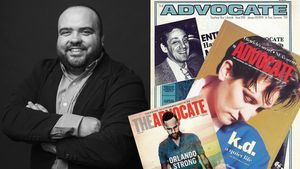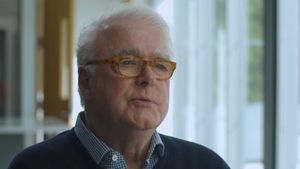
Treatment GuideJust DiagnosedSex & DatingAfrican AmericanStigmaAsk the HIV DocPrEP En EspañolNewsVoicesPrint IssueVideoOut 100
CONTACTCAREER OPPORTUNITIESADVERTISE WITH USPRIVACY POLICYPRIVACY PREFERENCESTERMS OF USELEGAL NOTICE
© 2025 Pride Publishing Inc.
All Rights reserved
All Rights reserved
Scroll To Top
By continuing to use our site, you agree to our Private Policy and Terms of Use.
In the 30th year of the AIDS epidemic and its 30th year of existence, Gay Men's Health Crisis still sees high demand for its services'and the agency's leaders say a move to bigger and better office space will help them continue to meet that demand. 'In those 30 years we've only moved four times, and each time we've moved, it's been to better serve people with HIV and AIDS,' says Marjorie Hill, CEO of New York City'based GMHC, the nation's oldest AIDS service provider. GMHC's latest move, in April, took it to 165,000 square feet of space at 446 W. 33rd St. in Manhattan. The location has several advantages over the old one, about 10 blocks away at 119 W. 24th St., where GMHC faced a 30% rent increase, Hill says. It has 45,000 more feet of usable space, spread over just two floors instead of the previous 12, allowing for improved service coordination for the agency's 11,000 clients, she says. While some activists, such as GMHC cofounder Larry Kramer, raised concerns about clients losing access to the hot meals served on 24th Street, Hill says the meal program will continue at the new location, which has the potential to serve more people with a 20% larger kitchen and brand-new equipment. For clients wishing to prepare food at home, the new space offers an expanded food pantry, named for late artist Keith Haring in recognition of the Keith Haring Foundation's $250,000 gift for the program. Other services moving to the new headquarters include health and nutrition education; legal, housing, and mental health support; vocational training; and case management. A second space, scheduled at press time to open in June, will house HIV prevention and testing services, continuing at the 24th Street location until then. The new Center for HIV Prevention, at 224 W. 29th St., will also be home to a new program offering educational and career guidance to people aged 13-18, regardless of HIV status. It's aimed at fostering the self-esteem that will help HIV-positive youths have better lives and help HIV-negative ones stay negative, Hill says. 'What helps a person use a condom is self-confidence, resiliency, self-esteem,' she says.
From our Sponsors
Most Popular
Lexi Love comes out as HIV+ after Trump deletes federal resources
January 23 2025 11:23 AM
Trump's orders prompt CDC to erase HIV resources
January 31 2025 5:29 PM
Grindr is reminding us why jockstraps are so sexy and iconic
May 02 2025 5:36 PM
BREAKING NEWS: Trump admin moves to end federal HIV prevention programs
March 18 2025 6:10 PM
This long-term HIV survivor says testosterone therapy helped save his life.
December 16 2024 8:00 PM
Discover the power of Wellness in your life
March 26 2025 12:41 PM
Celebrating Black History Month with our annual African American issue
February 01 2025 3:28 PM
Plus: Featured Video
Latest Stories
HRC holds 'die-in' to protest Trump health care cuts
April 28 2025 2:11 PM
Two right-wing Supreme Court justices signal they may uphold access to PrEP and more
April 21 2025 4:10 PM
500,000 Children at Risk: PEPFAR Funding Crisis
April 08 2025 3:51 PM
Broadway's best raise over $1 million for LGBTQ+ and HIV causes
April 03 2025 7:15 PM
The Talk Season 5 premieres this spring with HIV guidance for the newly diagnosed
March 26 2025 1:00 PM
Season 4 of The Switch on resilience & radical self-love returns this spring
March 26 2025 12:20 PM
Jess King is here to help you live your happiest, healthiest life yet
March 24 2025 4:35 PM
Gerald Garth is keeping people of color happy and healthy through trying times
March 11 2025 3:38 PM
Tyler TerMeer vows to continue to fight for health care for all
January 28 2025 3:00 PM
Plus nominated for 2025 GLAAD Media Award
January 22 2025 12:42 PM
A camp for HIV-positive kids is for sale. Here's why its founder is celebrating
January 02 2025 12:21 PM
'RuPaul's Drag Race' star Trinity K Bonet quietly comes out trans
December 15 2024 6:27 PM
Ricky Martin delivers showstopping performance for 2024 World AIDS Day
December 05 2024 12:08 PM
AIDS Memorial Quilt displayed at White House for the first time
December 02 2024 1:21 PM
Decades of progress, uniting to fight HIV/AIDS
December 01 2024 12:30 PM
Hollywood must do better on HIV representation
December 01 2024 9:00 AM
Climate change is disrupting access to HIV treatment
November 25 2024 11:05 AM











































































